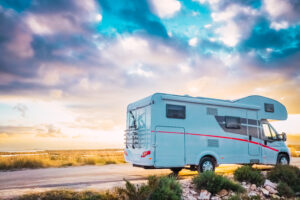When planning life on the road, one of the biggest decisions is choosing between a caravan vs motorhome. Both offer the freedom to travel at your own pace, explore new places, and enjoy the comforts of home while on the road. However, each has its advantages and drawbacks depending on your lifestyle, budget, and travel preferences.
This guide breaks down the key differences between caravans and motorhomes to help you make the best choice for your adventures.
1. Understanding the Basics
Before diving into the pros and cons, it’s important to clarify what sets caravans and motorhomes apart:
-
Caravan – A towable trailer that requires a separate vehicle to tow it. Once parked, you can unhitch it and use your car for exploring.
-
Motorhome – A self-contained vehicle that combines the living space and engine in one unit. There’s no need for a separate towing vehicle.
While both options provide mobile accommodation, they function quite differently, making it essential to choose the one that best fits your travel style.
2. Cost Considerations
Upfront and Ongoing Costs
-
Caravan: Typically more affordable than motorhomes when comparing similar levels of comfort and features. However, you will need a suitable towing vehicle, which may add to the overall cost. Insurance, registration, and maintenance are generally lower than for a motorhome.
-
Motorhome: Usually more expensive upfront due to the built-in engine and additional systems. Maintenance costs can also be higher because you’re servicing both a vehicle and living space in one.
Fuel Efficiency
-
Caravan: If you already own a capable vehicle, towing a caravan can be a cost-effective option. However, towing increases fuel consumption, especially for larger caravans.
-
Motorhome: Larger motorhomes tend to use more fuel than standard towing vehicles, but compact motorhomes may be comparable to or even more efficient than a caravan-towing setup.
If budget is a key factor, a caravan is often the more economical choice, especially if you already own a suitable tow vehicle.
3. Ease of Driving and Setup
Maneuverability
-
Caravan: Requires experience in towing, reversing, and maneuvering, especially in tight spaces. However, once parked, you can unhitch and explore with just your vehicle.
-
Motorhome: Easier to drive in most cases, as it operates like a large van or truck. However, maneuvering in urban areas and finding parking can be challenging.
Setup Time
-
Caravan: Setting up can take more effort, including unhitching, leveling, and connecting power and water.
-
Motorhome: Faster to set up—just park, apply the handbrake, and you’re ready to relax.
If you prefer a hassle-free setup and easier driving, a motorhome may be a better choice. If you don’t mind towing and want the flexibility of a separate vehicle for day trips, a caravan is worth considering.
4. Travel Flexibility
Exploring Once You Arrive
-
Caravan: Once parked at a campsite, you can unhitch and use your car for local trips, sightseeing, or quick errands.
-
Motorhome: Since your accommodation and transport are combined, you need to pack up everything each time you want to drive somewhere. Some travelers tow a small car behind their motorhome to solve this issue.
Campsite Accessibility
-
Caravan: Some larger caravans may not be suitable for all campsites, but in general, caravans offer better flexibility since you can park them and use a separate vehicle for accessing harder-to-reach areas.
-
Motorhome: Larger motorhomes may have restrictions in some camping areas, particularly off-road sites or places with tight access.
If you love the idea of setting up a base and exploring freely with your car, a caravan is a great option. If you prefer simplicity and don’t mind packing up before driving off, a motorhome may work better.
5. Comfort and Living Space
Both caravans and motorhomes come in a variety of sizes, from compact setups to luxury models with full kitchens, bathrooms, and entertainment systems.
-
Caravan: Typically offers more spacious layouts for the price, as all available space is used for living rather than including a driving cabin.
-
Motorhome: While often more compact, motorhomes provide convenience, especially for quick overnight stops where you don’t need to step outside to access your living space.
Motorhomes are better for those who want an all-in-one, self-contained vehicle, while caravans provide more flexible space at a lower cost.
6. Maintenance and Longevity
-
Caravan: Requires maintenance on brakes, suspension, and appliances but has fewer mechanical components than a motorhome.
-
Motorhome: Requires regular servicing like any vehicle, including engine maintenance, oil changes, and transmission checks, in addition to maintaining the living quarters.
A caravan may last longer than a motorhome since it doesn’t have an engine, which eventually wears out over time. However, both require regular care to remain in top condition.
7. Which One Suits Your Lifestyle?
A Caravan May Be Right for You If:
✔ You already have a suitable towing vehicle or are willing to invest in one.
✔ You prefer setting up a base camp and using a car for day trips.
✔ You want a cost-effective travel option with lower maintenance costs.
✔ You enjoy spending extended time in one location.
A Motorhome May Be Right for You If:
✔ You want an all-in-one vehicle that is quick to set up and move.
✔ You don’t want to tow or deal with reversing and parking a caravan.
✔ You take frequent short trips and need easy overnight stays.
✔ You prefer the convenience of driving and living in the same space.
Both caravans and motorhomes offer fantastic ways to travel and explore, but choosing the right one depends on your budget, travel habits, and personal preferences.
If you need help deciding or want professional servicing for your caravan, AllBrand Caravan Services is here to help.
📞 Phone: 3869 2969
📧 Email: info@allbrandcs.com.au
📍 Address: 101 Connaught Street, Sandgate, QLD, 4017
🌐 Website: www.allbrandcs.com.au
Let us help you get road-ready for your next adventure! 🚐✨
Useful Resources:
